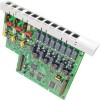Panasonic KX-TA82483 Programming Guide - Page 85
Access Levels, 3.6 Standard Buttons
 |
UPC - 037988851393
View all Panasonic KX-TA82483 manuals
Add to My Manuals
Save this manual to your list of manuals |
Page 85 highlights
3.5 Access Levels Area Firmware Version PBX Model Code Values Ver x.x.x xxxxxxxxxxxx (e.g., Ver 1.0.0 Y591AA030519) M Description Displays the version number of the PBX software. The numbers following are the ROM version and the date of creation. Displays the model code assigned to the PBX. 3.5 Access Levels There are 2 main levels of access to the Maintenance Console software: Installer and User. Installer-level users can view and edit all settings, in addition to choosing the options and screens available to User-level users, through the 7.3 Screen Customize option in the View menu. It is necessary to enter the Installer-level password to log on to Maintenance Console at Installer level. However, User level access may or may not require a password, depending on whether one has been set in Programmer Code Change. (See 7.2 Programmer Code Change) Access to menu options within Maintenance Console also depends on the current software mode (See 3.3 Software Modes). The target users for each access level are as follows: Level User Installer Use For end users For dealers or system installers 3.6 Standard Buttons There are several standard buttons that are displayed on most screens within Maintenance Console, and perform the same function on each screen. The standard buttons are as follows: Button OK Cancel Apply Help Function Implements changes and closes the current screen. Abandons changes and returns to the previous screen. Implements changes and remains on the same screen. Displays the relevant help topic for the current screen. Programming Manual 85















